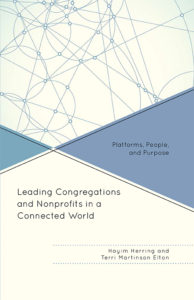More on: Leading Congregations in a Connected World: Platforms, People and Purpose
40% Hanukkah and Christmas Discount Still Available
My colleague, Dr. Terri Elton, Associate Professor Leadership at Luther Seminary and I, have been highlighting key findings from our recent publication, Leading Congregations in a Connected World: Platform, People and Purpose. (In our last post, we explained the link between organizational structure and impact.) Our issue in this post: congregational and nonprofit communities are very fragile these days! Can congregations be places where people who hold diverse views continue to join together in prayer? Can nonprofits continue to mobilize volunteers around causes that are directly related to their missions? Or, has the toxic effect of social media seeped into physical spaces so that people who used to worship and work together can no longer do so when they meet face-to-face?
When we asked congregational and nonprofit leaders profiled in our book about pressing challenges, they consistently responded with one word: “Community!” We could feel their anxieties around this issue and, from our perspective, for good reason. Congregations are at their best when they are inclusive. Diversity is not its own goal, but a value that enables people to engage with the “other” – a person from another generation, a different background, a spiritual orientation or political view. In that encounter with an “other,” both people have an opportunity to grow by experiencing difference. They grow more deeply in who they are because the encounter affirms a belief or value, or they grow because they modify a part of themselves.
We conducted our research a good year prior to the nastiness of the 2016 presidential campaign. But already then, the issue of community preoccupied the minds of clergy and chief executive officers. Think for a moment—aside from congregations, what other institution is designed to take people at all stages of life and grow with them over time? Congregations, and to a slightly lesser extent, faith-based nonprofits, are inherently lifelong centers for creating and sustaining communities with a wide mix of people.
 We see a significant role for congregations and nonprofits around the issue of community. But given how fragile and complex community is today, we believe that congregations will benefit by learning from one another. One opportunity for shared learning is in gaining greater understanding about the limits of digital space in engaging members and participants. What kinds of “conversations” are effective on digital platforms and which are best held in a physical space? What happens when a professional or volunteer publishes information about an issue that is unintentionally misleading or inaccurate—or simply false? One of clergy leader in our study framed the issue this way. He said that for now, he’ll take an old-fashioned town hall meeting about an important issue over a digital discussion because “there’s an accountability piece missing” online. When people don’t have to make eye contact with one another, they have to grapple with the impact of their words.
We see a significant role for congregations and nonprofits around the issue of community. But given how fragile and complex community is today, we believe that congregations will benefit by learning from one another. One opportunity for shared learning is in gaining greater understanding about the limits of digital space in engaging members and participants. What kinds of “conversations” are effective on digital platforms and which are best held in a physical space? What happens when a professional or volunteer publishes information about an issue that is unintentionally misleading or inaccurate—or simply false? One of clergy leader in our study framed the issue this way. He said that for now, he’ll take an old-fashioned town hall meeting about an important issue over a digital discussion because “there’s an accountability piece missing” online. When people don’t have to make eye contact with one another, they have to grapple with the impact of their words.
Meeting an “other” can be positively disorienting. Stereotypes that people carry inside of their heads often don’t resemble that “other” who stands beside them, engaged in sacred, mission-driven work. We invite you to share your suggestions about how congregations and nonprofits can continue to be places where diversity brings out the collective best in a community. So please connect with Hayim (options for social media of your choice, top right) or with Terri (telton@luthersem.edu, www.facebook.com/terri.elton, @TerriElton) and contribute your wisdom to these unprecedented questions.
